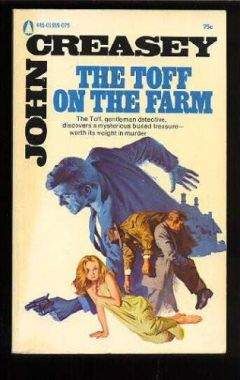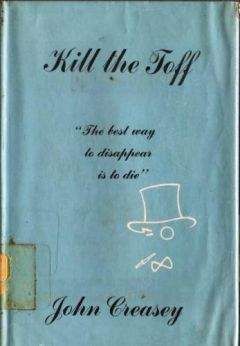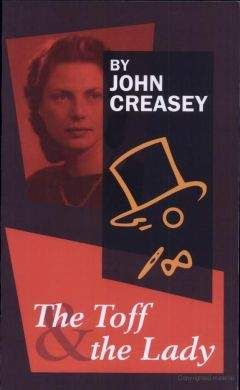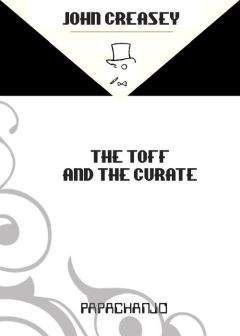John Creasey - The Toff and The Sleepy Cowboy
He was not young in the sense that teenagers are considered to be young, but he was a century away from being old. In most moods, and this was one, he had exemplary patience, and the silence from the telephone did not worry him.
In fact, he was day-dreaming.
It was comparatively early in the morning; half-past eight. He had been at the home of friends the night before, and back here late, so when the telephone had disturbed him he had not woken easily. It had been the overseas operator to ask if he could take a call from New York in half an hour’s time. So he had had time for his tea in bed, to scan the newspapers, even to shave. By the time the telephone bell had rung again he had been in this room. Waiting.
And studying the Trophies.
That was his man’s word for the strange assortment of objects on the wall behind the desk, and it was a good choice, for each was indeed a trophy of the hunt. In every case the quarry had been human, in most cases a man, but some had been women.
All were murderers.
Many had been hanged, before the laws of England had so changed that men and women were no longer hanged by the neck until they were dead, but sentenced, on conviction of murder, to ‘life’ imprisonment. Rollison kept an open mind on the subject of capital punishment but did not think that ‘life’ should prove, as it so often did, no more than nine or ten years in prison. Yet there were murderers whom he would have let off scot-free had he been judge and jury.
But none such as those he had been hunting until they had died or had been caught and tried, and later represented on this wall. For these trophies were of deadly killers; mostly evil men. The small tube of poisons reminded him of the hideous doctor who gave prostitutes a drug to make them scream and writhe — and while they were in contortions of agony the doctor possessed them. The top hat had two bullet holes; the second had knocked the hat off his head, some nine years ago. The lipstick had contained potassium cyanide, so that the user, breaking a thin coating protecting the lethal dose, had daubed her lips and died. Even the nylon stocking, looking solitary and strangely seductive draped over a skeletal foot, had been used to strangle a woman.
These things Rollison remembered as he waited.
He saw his man, Jolly, appear at the door leading from the kitchen, and sadly shook his head; Jolly by now, would have bacon and eggs all ready for the pan and would be exasperated by this delay.
Suddenly, a man said: “Mr. Rollison?” in an unmistakable American voice.
“Yes,” Rollison said, almost startled.
“Mr. Rollison, I’m sorry to bother you at this time, but my name is Selly, Jim Selly, of the New York Times. You might even remember me.”
Vaguely he did, thought Rollison, but he made a non-committal noise, and allowed Selly to go on:
“Mr. Rollison, are you expecting a visit from a friend from Arizona?”
“From where?” asked Rollison, startled again. “From Tucson, Arizona.”
“I’m afraid I have to say that I’m not,” replied Rollison. “I’m not expecting a visitor from anywhere in America, and I don’t think I know anyone in Tucson —or Arizona, for that matter.” He wondered why a news-paperman should call to ask such a question, but news-papermen were strange creatures with insatiable appetites for new twists and angles, so he did not wonder deeply. “Why do you want to know?”
“Are you sure you don’t know anyone from Tucson, Arizona?” Selly sounded acutely disappointed. “I am positive,” insisted Rollison.
“This man’s name is Loman — L-O-M-A-N. Is he a friend of yours?”
“Not,” answered Rollison, feeling wide awake for the first time, “unless he has changed his name. Why do you think I know a Mr. Loman?”
“He said that he knew you,” Selly answered.
“Oh,” said Rollison, baffled. “And is he on the way to see me, do you say?”
“Yes,” replied the newspaperman, and he paused. Rollison had a feeling that he was going to ask again ‘You’re sure you don’t know the man’ but thought better of it. “Well, thank you,” Selly went on. “Goodbye, sir.”
He rang off.
Rollison put down his receiver, still puzzled and more than a little frustrated. Selly might at least have told him more about this Loman from Arizona. He was contemplating the wall without really seeing it when Jolly appeared again. Jolly was half a head shorter than Rollison, an elderly man who had sad-looking, dark brown eyes, deep lines all over his face and a dewlap which had become wizened; he had the general appearance of a man who had once been fat but, after much self-sacrifice, had become thin; and dyspeptic. He had served Rollison since his schooldays, and these men were close friends.
Jolly was dressed in striped trousers and a white shirt and wore a green baize apron.
“Shall I put the eggs on, sir?”
“Jolly,” said Rollison, “do we know a man named Loman?”
After a moment’s reflection, Jolly answered: “No, sir. Should we?”
“I suspect that we are going to find out. Yes, put on the eggs, and I’ll tell you about the call while I have breakfast. Have you had yours?”
“Oh, yes, sir.”
“Then have some coffee while I eat,” said Rollison.
Between now and breakfast being served there would be no time to dress, so he went to a wall which was at angles with the trophy one and took down a World Gazetteer, then thumbed the pages until he found Tucson, pronounced, it was said, Teu-sonn. It was a city of some three hundred and fifty thousand people, with mountains to the north and south, the east and west. There the sun shone on most days of the year and it could become much too hot but seldom too cold. Near it were many mines, mostly producing copper, and the final word was : ‘Tucson is one of the five quickest growing cities in the United States judged on population.’
“Humm,” Rollison said to himself.
Immediately, Jolly appeared with a tray which he placed on a table in a small, raised dining-alcove at one end of this large room. Rollison set to, Jolly drank coffee, Rollison told the story briefly, and Jolly remarked :
“I remember Mr. Selly, sir.”
“You do?” Rollison was intrigued.
“He came one day when you were out,” Jolly informed him, “and asked me what a Toff was.”
“Oh,” said Rollison, still further intrigued. “What did you tell him?”
“That a toff is a toff, sir.”
“I am sure that conveyed everything he needed to know,” Rollison said drily.
“Of course I elaborated somewhat,” went on Jolly urbanely, “but basically it is a difficult term to define, especially to this generation.” When Rollison speared a piece of bacon, obviously expecting him to go on, Jolly continued: “I told him that a toff was a gentleman of high social standing who exerted himself to do great good among the less fortunate members of society.”
“Oh,” Rollison said. “Can’t we do better than that?”
“Can you, sir?” inquired Jolly.
“I shall think about it,” Rollison decided, and after a liberal helping of bacon and eggs, spread butter and a dark-coloured marmalade on toast, finished breakfast and went to his room to dress. It was not one of his good mornings, for his attempt to define a ‘toff’ proved both disconcerting and abortive. He found that Jolly had made his bed and laid out a medium weight suit of heather colour, perhaps as satisfactory as any for this autumn day. “A toff,” he said in a complaining voice, “is a man who gets waited on hand and foot and is rich enough to give hand-outs.” He knew that was not fair to himself, laughed aloud, dressed, and was going into the big room when the telephone bell rang again.
“I’ll get it!” he called, and this time sat down with his back to the Trophy Wall, plucked up the receiver, and said: “Richard Rollison.”
“Good morning, Rolly,” said a man with a familiar voice. “And what have you been up to?”
“Bill” Rollison almost groaned.
“That’s right. Come on, now. You might as well confess.”
“Bill,” interrupted Rollison in a tone of mock des-peration. “You are the very man I need. Who better than Chief Detective Superintendent William Grice of New Scotland Yard to tell me what I am? Bill — can you define ‘a Toff?”
There was silence.
He had at least gained time to think, but thinking did not take him far. Grice was both old adversary and old friend, and had been concerned in most of the cases remembered on the Trophy Wall. Frequently, when he, Rollison, became involved in an inquiry it was before the police discovered that there was anything to inquire about. At such times Grice was likely to call and ask: “What have you been up to?” Rollison could not think of a single recent activity which could justify the question.
At last, Grice said: “A toff is a toff, of course.”
“You’re a great help,” said Rollison heavily. “Nothing.”
“What?”
“I have been up to nothing which might interest you.”
“That is the one thing about you I would never believe,” retorted Grice. “You can’t expect me to believe it, either.”
“Bill,” Rollison said, pleadingly, “be more specific, will you? It has been one of those mornings. I can’t get any sense out of anybody and least of all from myself. What makes you think I have been ‘up to something’?”
Again there was a pause, doubtless while Grice decided whether he was stalling or whether he was genuinely baffled. Rollison made himself more comfortable in his chair. Suddenly, Grice said: “Just a minute, Rolly,” and Rollison held on, hearing voices in the background; someone had come in Grice’s office. This time Rollison felt the stirring of impatience; he seemed to have done nothing but hold on at the telephone all the morning. The delay was very short, and Grice came back in a stronger voice: “What do you know of a man named Thomas G. or C. Loman?”
Rollison sat bolt upright in his chair.
“And don’t say ‘nothing’,” Grice almost barked.
“Bill,” said Rollison, faintly, “I know next to nothing. An American newspaperman named Selly called from New York this morning and asked me if I were expecting a visit from a man named Loman. I answered truly : I was not. He then wanted to know if I knew any Loman.
I answered as truly : I did not. He added that Loman hails from the city of Tucson, in —”
“I know where he hails from,” interrupted Grice. “Is this gospel, Rolly ? You really don’t know him?”
“Until this morning I had never heard of him. I couldn’t have placed Tucson with any accuracy on a map, either.”
“Never mind Tucson.” There was another pause and a murmur of voices, as if Grice were in consultation in his office. Then Grice came back and demanded in one breath: “If you don’t know him, how is it he has your name and address as his final destination in London on his travel documents.”
“He has?” exclaimed Rollison.
“I have his ticket in front of me, and on it your address is quoted as his English destination.”
“You know,” Rollison said. “I wish he would come. I would like to ask him a thing or two.”
“Well,” Grice said, “he can’t.”
The phrase struck an ominous note and moved Rollinson’s emotions from bewilderment with an under-tone of frustration to apprehension. He did not ask why Thomas G. Loman could not come to see him, but knew of at least one very good reason: that he was dead.
Grice went on slowly, as if grudgingly : “Not yet, at all events.”
The devil, thought Rollison, he’s having me on. Aloud, he asked: “Is he hurt?”
“He’s unconscious.”
“What put him out?” demanded Rollison, sharply.
“A shot of morphia,” Grice stated, without any hesitation at all. “When the aircraft arrived at Heath Row this morning he was found unconscious in his seat. At first the stewardesses thought he was asleep, but it is much more than that. He’s in the airport hospital now, and I’ve just had the report saying that he’s under morphine and that there are hypodermic needle punctures in his right and left forearms.” There was a long pause which could only be called pregnant, before Grice demanded in a voice laden with doubt: “Are you sure you don’t know him? Are you sure you’re not up to something you’ve forgotten to tell us about?”
Very slowly, Rollison answered: “I am quite sure, William.”
“Then why the devil should he have been coming to see you?” demanded Grice. “He’s got no luggage and no money in his wallet. His American passport is valid. Either he left New York quite empty handed or else he’s been robbed.”
4
Face to Face
“BILL,” ROLLISON SAID with quiet persistence, after a long, pregnant-type pause, “I can’t answer any of the questions about this man because I don’t know a thing about him. Unless —”
“Ah!” broke in Grice, semi-triumphant.
“Unless he’s using a false name, which would presum-ably mean using a false passport,” Rollison finished.
“I have known friends of yours do such things,” Grice observed, cuttingly.
“Bill,” said Rollison in his gentlest voice. “You aren’t exactly in the friendliest of moods this morning, are you?”
There was a short pause, followed by a staccato exclamation, before Grice said in tacit agreement:
“I must have got out of bed the wrong side. Can you go to the airport?”
“To identify the man, if by chance I do know him under some other name?”
“Yes.”
Rollison pondered. He had a committee meeting for a fund-raising group for Cancer Research but they could get on without him, and he had a luncheon appointment with, his accountant, who could easily be put off; and in any case a ‘no’ would probably make Grice’s mood even more difficult. So he said in the most conciliatory tone:
“Yes, Bill, I can leave here in twenty minutes or so. Will you be there?”
“I wish I could be but I’ve a Commissioner’s meeting,” Grice answered. The overhanging threat of that could partly explain his mood. “You know Paterson of the Airport Police, don’t you?”
“Slightly.”
“I’ll tell him to expect you,” Grice promised. “And thanks.”
“I really can’t wait to meet Thomas G. or C. Loman,” Rollison told him.
“I’ve just made sure it’s G., as in George,” asserted Grice.
“Thanks. I’ll let you know how I get on,” Rollison promised, and rang off.
For a few moments he sat back, frowning at the ceiling, and did not look round when Jolly came in. Jolly would have heard the conversation on the kitchen extension: it was accepted that he should listen to all but personal calls, thus saving the need for explanation on matters he would need to know about in any case. “What do you make of it?” Rollison asked.
“Peculiar is one word, sir.” Jolly came further into the room.
“Suspicious?” asked Rollison.
“In the sense that this could be an attempt to involve you in some affair without you knowing?” asked Jolly. “Yes.”




